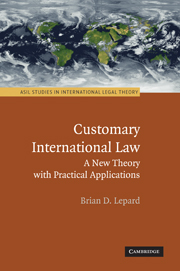Book contents
- Frontmatter
- Contents
- Figures
- Acknowledgments
- Cases
- PART ONE THE ENIGMAS OF CUSTOMARY INTERNATIONAL LAW
- 1 The Need for a New Theory
- 2 Some Conceptual Enigmas
- 3 Some Practical Enigmas
- PART TWO FOUNDATIONS OF A NEW THEORY OF CUSTOMARY INTERNATIONAL LAW
- PART THREE RESOLVING THE CONCEPTUAL ENIGMAS OF CUSTOMARY INTERNATIONAL LAW
- PART FOUR RESOLVING THE PRACTICAL ENIGMAS OF CUSTOMARY INTERNATIONAL LAW
- PART FIVE SOME APPLICATIONS OF THE THEORY
- PART SIX THE FUTURE OF CUSTOMARY INTERNATIONAL LAW
- Bibliography
- Index
3 - Some Practical Enigmas
Published online by Cambridge University Press: 05 June 2012
- Frontmatter
- Contents
- Figures
- Acknowledgments
- Cases
- PART ONE THE ENIGMAS OF CUSTOMARY INTERNATIONAL LAW
- 1 The Need for a New Theory
- 2 Some Conceptual Enigmas
- 3 Some Practical Enigmas
- PART TWO FOUNDATIONS OF A NEW THEORY OF CUSTOMARY INTERNATIONAL LAW
- PART THREE RESOLVING THE CONCEPTUAL ENIGMAS OF CUSTOMARY INTERNATIONAL LAW
- PART FOUR RESOLVING THE PRACTICAL ENIGMAS OF CUSTOMARY INTERNATIONAL LAW
- PART FIVE SOME APPLICATIONS OF THE THEORY
- PART SIX THE FUTURE OF CUSTOMARY INTERNATIONAL LAW
- Bibliography
- Index
Summary
WHAT ARE THE PROPER SOURCES OF EVIDENCE OF OPINIO JURIS?
Turning to some of the practical enigmas of customary international law, the traditional doctrine provides scant guidance on what kinds of state acts should constitute evidence of opinio juris. For example, in principle an immense variety of sources can be consulted, ranging from diplomatic correspondence to national judicial decisions. Moreover, the traditional doctrine allows for the consideration of both bilateral and multilateral treaties as well as United Nations (U.N.) resolutions. Again, however, it gives precious little counsel on how these sources are to be weighed or why particular kinds of acts should be accorded a particular weight.
WHAT IS THE ROLE OF TREATIES IN DETERMINING THE EXISTENCE OF OPINIO JURIS?
Commentators and courts have, for example, differed in their views of the role of treaties in determining the existence of opinio juris. In principle, treaties can provide evidence of opinio juris in at least two ways.
First, a treaty can codify a norm that has already been accepted as legally authoritative by states as customary law and that is therefore independently binding on them apart from the treaty. In this connection, Article 43 of the Vienna Convention on the Law of Treaties provides that the termination of a treaty or the withdrawal of a party does not “impair the duty of any State to fulfil any obligation embodied in the treaty to which it would be subject under international law independently of the treaty.”
- Type
- Chapter
- Information
- Customary International LawA New Theory with Practical Applications, pp. 30 - 44Publisher: Cambridge University PressPrint publication year: 2010



